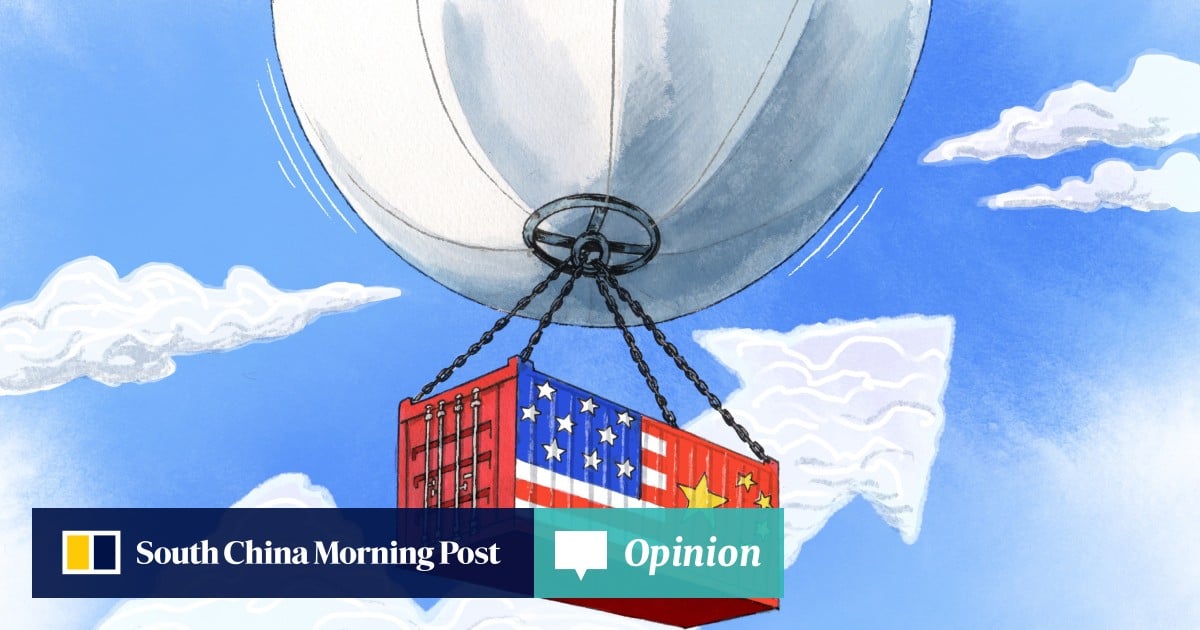Can China And Canada Forge An Alliance To Challenge US Policies?

Table of Contents
Economic Interdependence and Shared Interests
The foundation for any potential China-Canada alliance rests on significant economic interdependence and shared interests.
Trade Relations
Existing trade relations between China and Canada are substantial, creating a strong base for potential expansion.
- Canadian resource exports to China: Canada is a major exporter of lumber, oil, potash, and various minerals to China, vital for China's construction, energy, and agricultural sectors.
- Chinese manufactured goods in the Canadian market: Conversely, Canadian consumers benefit from a wide range of affordable Chinese manufactured goods.
- Potential for increased trade in technology and renewable energy: Both nations are actively investing in renewable energy technologies and could collaborate on research, development, and trade in this rapidly growing sector.
Strengthening trade ties would offer substantial economic benefits to both countries. However, reliance on each other also creates vulnerabilities. US trade policies, such as tariffs and sanctions, could significantly impact this relationship, incentivizing greater cooperation between Canada and China to mitigate these risks. Diversifying trade partnerships and reducing reliance on the US market is a shared interest that could drive closer bilateral ties.
Investment and Infrastructure
Foreign Direct Investment (FDI) flows between China and Canada present another avenue for enhanced cooperation.
- Chinese investment in Canadian infrastructure: China has invested significantly in Canadian mining and energy infrastructure, and further investment in transportation and other key sectors is possible.
- Canadian investment in Chinese infrastructure: While smaller in scale than Chinese investment in Canada, Canadian companies have opportunities for involvement in China's vast infrastructure projects.
- Potential for collaboration on sustainable infrastructure projects: Joint ventures in green energy, smart cities, and sustainable transportation infrastructure could yield mutual benefits and establish a model for international cooperation independent of US influence.
Joint infrastructure projects are strategically important, offering both economic returns and geopolitical leverage. By cooperating on infrastructure development, China and Canada could potentially challenge US dominance in shaping global infrastructure norms and standards, creating alternative models of development and investment.
Shared Concerns Regarding US Foreign Policy
Beyond economic considerations, shared concerns about certain aspects of US foreign policy provide further impetus for increased Canada-China cooperation.
Geopolitical Competition
Both Canada and China face pressures stemming from US foreign policy in several key areas.
- Trade disputes: Both countries have experienced trade disputes with the US, highlighting the potential benefits of a more diversified and less US-centric trading system.
- Technological competition (e.g., 5G): The US has actively sought to limit the deployment of Huawei's 5G technology globally, impacting both Canadian and Chinese interests.
- Concerns about US military presence: Both countries might share concerns regarding the extent and impact of US military presence in certain regions.
- Differing approaches to international organizations: Canada and China often hold diverging views on the role and function of international organizations, leading to potential alignment in advocating for reform.
These shared concerns create common ground for cooperation and a basis for a more strategic relationship. By working together, Canada and China could potentially mitigate US pressure and promote a more multipolar world order.
Multilateralism and International Norms
Cooperation on promoting multilateralism and upholding international norms is another area of potential convergence.
- Reform of the WTO: Both countries could advocate for reforms to make the WTO more effective and equitable.
- Climate change cooperation: China and Canada share a strong interest in combating climate change and could collaborate on various initiatives.
- Participation in international forums (e.g., UN): Both nations are active participants in UN forums and could coordinate efforts to advocate for shared interests.
- Upholding human rights principles: While differing in their approaches, both countries share a commitment to promoting human rights in their own ways, providing another potential avenue for cooperation.
A strengthened China-Canada relationship could champion a more balanced and equitable international system, challenging unilateral US actions and promoting the rule of law in international affairs.
Obstacles and Challenges to a China-Canada Alliance
Despite potential benefits, significant obstacles hinder the development of a strong China-Canada alliance.
Domestic Political Considerations
Navigating domestic political sensitivities is crucial for both countries.
- Public opinion in Canada regarding China’s human rights record: Concerns about human rights in China significantly impact Canadian public opinion and pose a challenge to closer ties.
- Concerns within China about Canada's alignment with US foreign policy: China might view Canada's close ties to the US with suspicion, hindering the development of complete trust.
- Potential backlash from US pressure: The US might exert pressure on Canada to limit its cooperation with China, creating further challenges.
Addressing these domestic political realities requires careful diplomacy and a commitment to transparent communication. Finding areas of common ground and managing public perceptions will be vital for building a stronger relationship.
Security Concerns and Strategic Trust
Security concerns represent another critical hurdle.
- Concerns about Chinese influence in Canada: Concerns about Chinese interference in Canadian affairs and potential espionage pose significant challenges.
- Potential for espionage: Mutual suspicion and concerns about intelligence gathering could undermine trust.
- Differing security alliances (e.g., NATO vs. China's alliances): Canada's membership in NATO and China's relationships with other countries create inherent differences in security approaches.
- Trust deficit between the governments: Building a strong relationship requires addressing existing trust deficits and fostering open communication channels.
Overcoming security concerns and building trust will be a long-term process requiring careful management of sensitive information and a commitment to transparency and mutual respect.
Conclusion
The possibility of a China-Canada alliance to challenge certain US policies presents a complex picture. While significant economic interdependence and shared concerns about US foreign policy offer potential for increased cooperation, domestic political sensitivities and security concerns represent considerable obstacles. A closer China-Canada relationship could lead to a more multipolar world order, but careful navigation of existing challenges is critical. Further research and analysis are crucial to understanding the viability and potential global implications of a closer China-Canada relationship. The possibility of a strengthened China-Canada alliance as a counterbalance to certain US policies warrants ongoing observation and critical analysis. Further study on the evolving dynamics of this relationship is essential.

Featured Posts
-
 Gavin Newsoms Toxic Democrats Remark A Political Backlash
Apr 25, 2025
Gavin Newsoms Toxic Democrats Remark A Political Backlash
Apr 25, 2025 -
 Bride Claims Bridesmaids Makeup Overshadowed Her Wedding
Apr 25, 2025
Bride Claims Bridesmaids Makeup Overshadowed Her Wedding
Apr 25, 2025 -
 Linda Evangelistas Raw Honesty First Reactions To Showing Mastectomy Scars
Apr 25, 2025
Linda Evangelistas Raw Honesty First Reactions To Showing Mastectomy Scars
Apr 25, 2025 -
 Pope Francis Three Days Of Public Mourning At St Peters Basilica
Apr 25, 2025
Pope Francis Three Days Of Public Mourning At St Peters Basilica
Apr 25, 2025 -
 Sherwood Ridge Primary School Accommodates Students Beliefs Regarding Anzac Day Observances
Apr 25, 2025
Sherwood Ridge Primary School Accommodates Students Beliefs Regarding Anzac Day Observances
Apr 25, 2025
Latest Posts
-
 Cavaliers Edge Blazers In Overtime Thriller Hunter Leads With 32
Apr 30, 2025
Cavaliers Edge Blazers In Overtime Thriller Hunter Leads With 32
Apr 30, 2025 -
 Hunters 32 Points Power Cavaliers To 10th Straight Win
Apr 30, 2025
Hunters 32 Points Power Cavaliers To 10th Straight Win
Apr 30, 2025 -
 Cp News Alert Ovechkin Ties Gretzkys Nhl Goal Record
Apr 30, 2025
Cp News Alert Ovechkin Ties Gretzkys Nhl Goal Record
Apr 30, 2025 -
 Ovechkin Reaches 894 Goals Matching Gretzkys Nhl Record
Apr 30, 2025
Ovechkin Reaches 894 Goals Matching Gretzkys Nhl Record
Apr 30, 2025 -
 Nhl History Ovechkin Ties Gretzkys Record Breaking Goal Count
Apr 30, 2025
Nhl History Ovechkin Ties Gretzkys Record Breaking Goal Count
Apr 30, 2025
